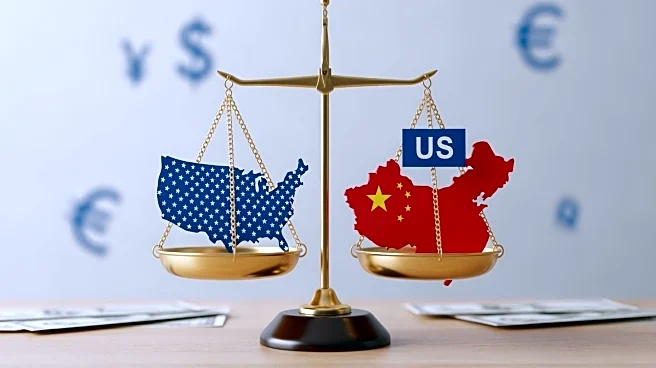What's Happening?
President Trump has labeled the current U.S. tariffs on Chinese goods as unsustainable, ahead of a planned visit by U.S. Treasury Secretary Scott Bessent to China. The comments come as both nations prepare for a new round of trade talks aimed at avoiding
further tariff escalations. Trump, in an interview with Fox Business, acknowledged the impact of the tariffs on the U.S. economy but defended their necessity, citing pressure from China. The tariffs, which have reached a cumulative rate of 157%, are part of ongoing trade tensions between the two largest economies. China recently expanded its export controls on rare earths, prompting Trump to threaten additional tariffs. The upcoming talks in Malaysia between Bessent and Chinese Vice Premier He Lifeng are expected to address these issues, with both sides aiming to reach a resolution before the current tariff agreement expires on November 10.
Why It's Important?
The ongoing trade tensions between the U.S. and China have significant implications for global economic stability. The tariffs have strained supply chains, particularly in the tech industry, where rare earths are crucial. The U.S. economy faces challenges from these tariffs, including increased costs for businesses and consumers. The potential for further escalation could lead to more severe economic consequences, affecting industries reliant on Chinese imports. The trade talks are critical in preventing a further downturn and stabilizing relations between the two countries. A resolution could ease economic pressures and restore confidence in global markets, benefiting stakeholders across various sectors.
What's Next?
The upcoming trade talks in Malaysia are a pivotal moment for U.S.-China relations. Both countries are expected to negotiate terms that could prevent further tariff increases. The meeting between Bessent and He Lifeng will likely focus on reducing existing tariffs and addressing China's export controls on rare earths. The outcome of these discussions could set the tone for future economic interactions between the two nations. Stakeholders, including businesses and policymakers, will be closely monitoring the talks for signs of progress or further conflict. The expiration of the current tariff agreement on November 10 adds urgency to these negotiations.
Beyond the Headlines
The trade tensions highlight broader geopolitical dynamics between the U.S. and China. The tariffs are not just economic measures but also reflect strategic positioning in global trade. The reliance on rare earths underscores the importance of diversifying supply chains to mitigate risks associated with geopolitical conflicts. The situation also raises ethical questions about the use of economic leverage in international relations. Long-term shifts in trade policies could influence global economic structures, prompting countries to reassess their trade dependencies and strategies.















